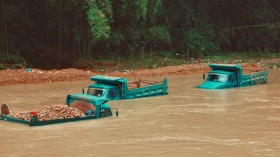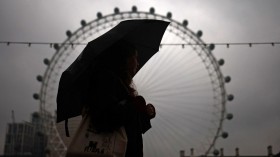Horse jockeys, skilled archers, and fierce wrestlers take the spotlight this week as Mongolia celebrates its national festival of Naadam. From July 11 to 15, the country revels in the "three manly games" of wrestling, archery and horse racing, the sports that once helped Genghis Khan test and train his greatest warriors.
"Oral traditions, performing arts, national cuisine, craftsmanship, and cultural forms such as long song, Khöömei overtone singing, Bie biyelgee dance and Morin khuur fiddle also feature prominently during Naadam," notes UNESCO. The festival harkens back to the culture of the nomadic tribes that have dwelled amid the steppes of Central Asia for hundreds of years.
Naadam itself is believed to be at least 800 years old, tour manager Michel Behar reveals in an interview. "You'll see archers with the same type of bow that Genghis Khan's armies used, made of birch, fish glue, and deer sinew," he says.
Genghis Khan himself is credited for instituting the "three games of men" that are the focus of Naadam (which means "games"). Mongolian wrestling, archery and horseback riding developed the skills he sought for the men in his armies. Recently, however, women have begun to participate in the Naadam archery games, and girls in the horse racing, reports BBC's Human Planet Explorer.
The Naadam horse races are limited to child jockeys, boys and girl aged 6 to 12 years old. They train in the months leading up to the race, but the Mongolians view the competition as primarily a test of the skills of the horses, not the riders. The race takes place cross-country, running for 15 to 30 km. The top three finishers among the horses win titles and medals, while the winning jockey earns the title of tumny ekh - "leader of ten thousand."
The archery competition is a colorful event with the players dressed up in deel, a traditional Mongolian outfit. Archers must stand, draw and shoot at a target set up 75 km away (65 km for women).
The most popular event in Naadam is wrestling, where two men face off and the first one who touches the ground (except with the feet or hands) loses the match. The wrestlers perform the bevekh, or eagle dance, before the match.
Many games take place throughout Mongolia during the midsummer holidays. But the biggest games are held in the Mongolian capital, Ulaanbaatar.
© 2024 NatureWorldNews.com All rights reserved. Do not reproduce without permission.
![Great White Sharks Observed for the First Time Changing Their Behavior in Different Marine Environments [Study]](https://1471793142.rsc.cdn77.org/data/thumbs/full/70251/280/157/50/40/great-white-sharks-observed-for-the-first-time-changing-their-behavior-in-different-marine-environments-study.jpg)



![Origin of Life: Discovery of Lava Being a Building Block of Life Hints 'Humans Have Volcanic Origins' [Study]](https://1471793142.rsc.cdn77.org/data/thumbs/full/70262/280/157/50/40/origin-of-life-discovery-of-lava-being-a-building-block-of-life-hints-humans-have-volcanic-origins-study.jpg)
